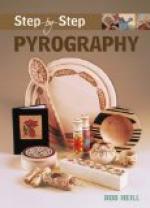The guests began to ask questions, first in Levantine, then in Arabic. Were there bazaars in Lundra? Did the people drink coffee? Had they camels? Did the muezzin call them to prayer? Did the women sleep upon the housetops? Was the city most like Aleppo the White, or Istamboul, or Damasc-ush-Shah? How many Muslimun were there? How many of the idolaters?
To these inquiries Nicholas replied, at first with faint amusement at the mingled shrewdness and ignorance of these men, then with a fierce pride in his city which made his words, as the letter-writer expressed it, shine like rubies and sing like a fountain. The merchants listened, and munched their sticky baclawi, ripe olives and dates and figs, and drank many tiny cups of coffee, more entertained than they had ever been by Mustafa. Finally the host sent for a basket of fruit—great pale Egyptian melons, pomegranates, oranges, figs—and graciously bestowed it upon the gifted galley-slave. He meant to come next day, he said, and with Mustafa’s permission behold the prowess of the English in swimming.
To every one’s surprise, Ahmed really came. Those who could swim were had out of their stifling quarters and allowed to do so. Nicholas could swim like an eel, and all were amazed when, after swimming farther out than any of the others, he flung up his arms, uttered a loud cry, and vanished. They watched and searched, but nothing more was seen of him, and there was mourning among the English.
But there was a Genoese galley in the harbor, and Nicholas had seen it. He had dived, swum under water as far as he could inshore, and come up with his head inside the scooped-out rind of a large melon. During the search the seeming melon quietly bobbed away toward a reedy shallow, and the swimmer hid among the reeds until dark, and then swam across to the Genoese ship. The captain knew Gilbert Gay and listened with interest to the youth’s story.
The Genoese captain did not care to interfere with’ Mustafa in a town full of his Moslem countrymen. He waited until the crazy trading-galley was well out to sea and rammed her with the beak of his own ship. Crossbowmen lined the rail, grappling irons were thrown out, and the captain, with Nicholas and some soldiers, went and unearthed Mustafa among bales of striped cotton. When he understood that they merely wanted all of his Feringhi slaves, he thankfully surrendered them.
“Shall we put this fellow to death?” inquired the captain. Mustafa understood the tone and gesture though not the words, and turned a dirty yellow-gray. “No,” said Nicholas Gay. “He was a good master—for an Arab.”
Mustafa took heart. He would never reach port, he complained, being so short-handed.
“You can work your ship under sail for that distance,” said the Genoese, twisting his mustachios, “if you dare loose your other slaves.” At that Mustafa had an ague. When they saw the last of him he was making slow and crooked progress.




